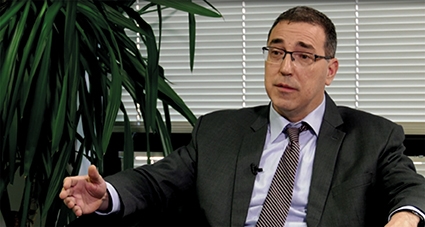IMF Representative: Georgian Economy Developing Well
Francois Painchaud, IMF Resident Representative in Georgia, believes that the Georgian economy is developing "quite well," despite the recent developments in the country, such as the upcoming second round of the presidential elections and fluctuation of the national currency.
“I would say the Georgian economy is developing quite well. Fundamental factors are in place, the increase is high, inflation is low and the macroeconomic policy is reasonable,” he told bm.ge.
However, the IMF Resident Representative says the main challenge in Georgia is inclusion in the economy and the high rate of poverty.
Painchaud explained that relative poverty has also increased, as shown by UNICEF’s latest study.
“It means that the government should carry out planned reforms, improve the business environment, better connect with trade partners and strengthen trade relations,” he said.
He went on to positively evaluate the government’s decision to increase the state pension from GEL 180 to GEL 200 from 2019 and to fivefold increase support for socially vulnerable children under the age of 16 from next year. He expressed hope that these activities will reduce poverty in the country.
Painchaud says the recent fluctuations of the national currency GEL are caused by several main factors, including tax balance, external shocks, uncertainty, expectations and global strengthening of the dollar.
“We think that the National Bank of Georgia should retain the floating rate. Georgia has experience of reducing the influence of shocks with a flexible exchange rate,” he noted.
He also added that the National Bank is focused on price stability, adding it is close to its target.
“In addition, the exchange rate is flexible and performs the absorption of shocks. The policy of the National Bank is aimed at accumulating reserves,” the IMF Resident Representative in Georgia noted.
The International Monetary Fund stated that at least 18 years is the time the Central Asia and Caucasus countries will need to increase revenue per capita to what it is in European countries.
The last overview of the countries of Central Asia and the Caucasus reads that economic growth forecasts for this region are “historically low”, and with this factor and demographic trend, it needs almost two decades for said countries to change their low-income status to the status of countries with the income of emerging markets.
In late October, IMF Mission Head Mercedes Vera-Martin, told journalists that Georgia has good economic indicators in terms of growth in tourism, export and money transfers, noting that this year, a 5.5% economic growth is expected in Georgia.
According to the IMF assessment, the sustained implementation of the authorities’ reform agenda will support higher and long-lasting growth and increase the resilience of the economy.
Currently, 189 countries are members of the International Monetary Fund. Georgia joined the IMF on May 5, 1992.
By Thea Morrison
Image source: BM












